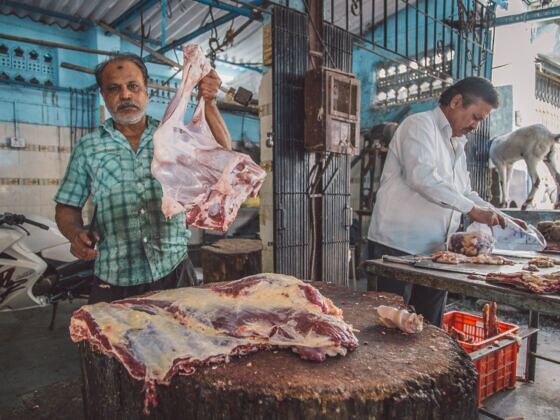There are a ton of reasons to not eat meat. For one thing, most Americans eat 50% more meat than the recommended daily amount, and that much meat can lead to kidney stones, higher blood pressure, and an increased risk of cancer and diabetes. For another, the treatment of animals in assembly-line slaughterhouses is chilling to say the least. And oh, hey, the meat industry’s responsible for just under 15% of manmade greenhouse gas emissions, making it one of the top contributors to global warming.

But I’m a weak person. I’m not a vegetarian. I’ve tried plenty of times in my life to cut meat out of my diet, and I’ve never been particularly successful at it. Usually, I’m able to go a few weeks or months without eating any meat — and usually I lose weight and feel better during that period — until something kicks me off the wagon. There have been a number of things that have ruined it for me.
Once, it was Thanksgiving, my all-time favorite. I love turkey and gravy and stuffing, and not eating it was not an option. Another time, it was because of PETA’s ugly tendency to fight humans treating animals like meat by treating women like meat. Another time it was because I was walking home drunk from a party and passed a shawarma shop. But far and away, the biggest obstacle to my continued vegetarianism has been travel.
Ethics vs. manners
Chef and food writer Anthony Bourdain is no friend to the vegetarian movement. He calls vegetarians “the enemy of everything good and decent in the human spirit,” while vegans are a “Hezbollah-like splinter faction,” who are “completely self-indulgent.” It would probably offend no one (including Bourdain himself) to say the man’s a bit of a dick, but he does manage to raise one good point about vegetarians:
“They make for bad travelers and bad guests. The notion that before you even set out to go to Thailand, you say, ‘I’m not interested,’ or you’re unwilling to try things that people take so personally and are so proud of and so generous with, I don’t understand that, and I think it’s rude. You’re at Grandma’s house, you eat what Grandma serves you.”
I’m not sure if Bourdain’s had a specific experience with travelers where they sniffed down their nose at some Thai peasant serving them meat, but that’s never been my experience of vegetarian travelers — the ones I know are generally pretty cool about their dietary preferences and don’t shit on the locals. But when I travel, I can’t bring myself to refuse a meal put in front of me, regardless of whether it has meat, and this inability’s knocked me off the wagon more times than I can count.
Visiting carnivorous places
Some locales, I’ve found, are easy places to be a vegetarian in. I grew up in the Midwestern US, where barbecue is an institution, so visiting places like New York or London was a treat. It was so easy to be an herbivore there because there was a community around it. Being a vegetarian in India has to be a cinch because it’s been part of the culture there for centuries. But other places don’t have that culture, and in those places it isn’t even possible to be a vegetarian.
For example, my sister lived in El Salvador for years, and though she was a vegetarian when she arrived she soon reverted to omnivorism. The reason wasn’t any weakness of will but simply that if she told her hosts she was vegetarian, they’d often serve her meat products anyway, either out of ignorance, misunderstanding, or general bullheadedness. Eventually she just resigned herself to eating meat on a regular basis while she was living there, and then when she returned to the US she cut back her meat intake again.
My solution to the ethics vs. manners problem of vegetarianism (you know, when I’m actually being a successful vegetarian) is to simply let the manners win. The vast majority of the time that I’m eating, I’m eating something I either bought from a restaurant or I made personally. If someone places something in front of me that has meat in it, I’ll eat it because I have the genuine desire to experience their food culture as they present it to me, and I have the genuine desire to not patronizingly force my culture’s morality on them.
Because, ultimately, it’s my country that eats the most meat (well, second per capita, behind tiny Luxembourg) and it’s my country I have the greatest ability to change. Like every ethical fight, it has to start at home, and like every ethical fight, nobody’s particularly well served by my being rude.